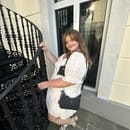Growing up in Appalachia, the mountains were sheltering, literally and figuratively. God and the gospel dominated much of my childhood, but my mom would call us back-row baptists, who sometimes fall asleep during church. But, I feel she calls herself a back-row baptist because she hasn’t followed all the rules women are meant to follow within society and sees herself outside the norm. In the Bible, 1 Timothy 2:12 says, “but I suffer not a woman to teach, nor to usurp authority over the man, but to be in silence.” They tell women to be silent. Organized religion taught me to be afraid of my thoughts. Due to the lack of questioning in religious circumstances, I couldn’t ask why women had so many more rules to obey than the men who imposed these rules.
As I deviated from this thought pattern, I became more interested in what creates this significant divide between women and men. I self-identified as a feminist at fourteen during the 2016 election year; I saw how a public figure – a potential future president – could talk about women, people of color, and queer folks, only to get away with it. To me, this was infuriating. Coming from a predominantly conservative area, I never felt heard. When I tried talking to other women about how I felt, they dismissed me by saying, “that’s the way it’s always been.” I began to understand that this divide between men and women, which creates strict, binary gender roles, and heteronormativity, was more than I initially thought. It was systematic and embedded in all institutions, not just religion. Patriarchy is a big and scary word everyone assumes is an attack on men. It isn’t men themselves but the system that privileges men and masculinity. Throughout my life, I saw my chronically ill, single mother impacted by this. We expect single mothers to work full-time and do unpaid labor at home, including housekeeping and caring for the children. As a type 1 diabetic, my mom suffers from chronic pain. The result of this chronic pain was a drug addiction that allowed her to continue working 40 hours or more a week while raising a child. At many moments in my lifetime, my mom struggled to afford insulin, a medication that keeps her alive. While I am not dismissing my mother’s achievements and accomplishments, I want to point out that she encountered disadvantages because of her position as a lower-class woman. After recognizing that these occurrences resulted from a patriarchal society, these first-hand experiences continue to inform my current interest in feminism and provide an explanation of why gender equity is meaningful to me.
Because many of the women that I know are survivors of interpersonal violence and experience the results of gender inequity, including my mom, I have been interested in work that services women who have these experiences. I never understood what that looked like for me until I became an intern at the NC State Women’s Center. Doing this was an essential step in determining what’s important to me. Through interning at the Women’s Center, I discovered various careers that take part in advocacy and educating about interpersonal violence. Choosing to major in English was choosing something that I am passionate about focusing on. However, as I realized my interest in service, I felt English limited my options. Joining the Women’s Center team was a pivotal moment in my journey. I learned that many people I worked with had majored in English during undergrad and continued to receive master’s and doctorate degrees. I discovered I put myself into a box without needing to, and I didn’t leave any room for growth outside of that. While I knew that literature was essential to me, there were other things that I wanted to experience during college.
Interning at the Women’s Center has positively impacted my speaking ability. Not only to speak about a vulnerable topic but also topics that involve confidence. Sometimes, because of the socialization that young women undergo, I lose my voice. It’s nerve-wracking to be put under pressure and say what you think. I never want to be wrong, so I don’t allow myself to be correct. As I mentioned, I felt ignored when I raised my concerns and couldn’t question things. The patriarchy teaches women to be submissive and subordinate; the system doesn’t want us to have our thoughts in a religious institution and everyday life. As a woman, I worry about being bossy or being perceived as hateful because women are not allowed to be assertive like men. Previously, when asked by a supervisor if I see myself as a leader. My answer was no. When I thought of a leader, I thought of someone strong, assertive, powerful, and authoritative. Unsurprisingly, all of those attributes are traits of the male archetype. I know leadership is about teamwork, even if I do not have any of those qualities. I am learning to have confidence in my ability to lead. I can be a leader and lead softly and collaboratively. The Women’s Center and the people there are helping my leadership skills blossom.
Overall, I would’ve lost many crucial moments at NC State without ever interacting with the Women’s Center or applying for the internship. As well as being a great workplace and providing me with a calming place to become a leader, the Women’s Center benefits NC State as an entire community. Given our current political climate surrounding women’s rights in the United States, creating a space for women to exist safely is more important than ever. The center provides critical educational resources about violence against women, consent, and safe sex and also includes support for survivors of interpersonal violence. These provide information that should be important to everyone, not just women. As a student at NC State, I consider it of utmost importance to have these resources available, especially considering the violence against women that continues to happen on college campuses; it allows women a space for comfort, safety, and an opportunity for advocacy, growth, and community outreach.


